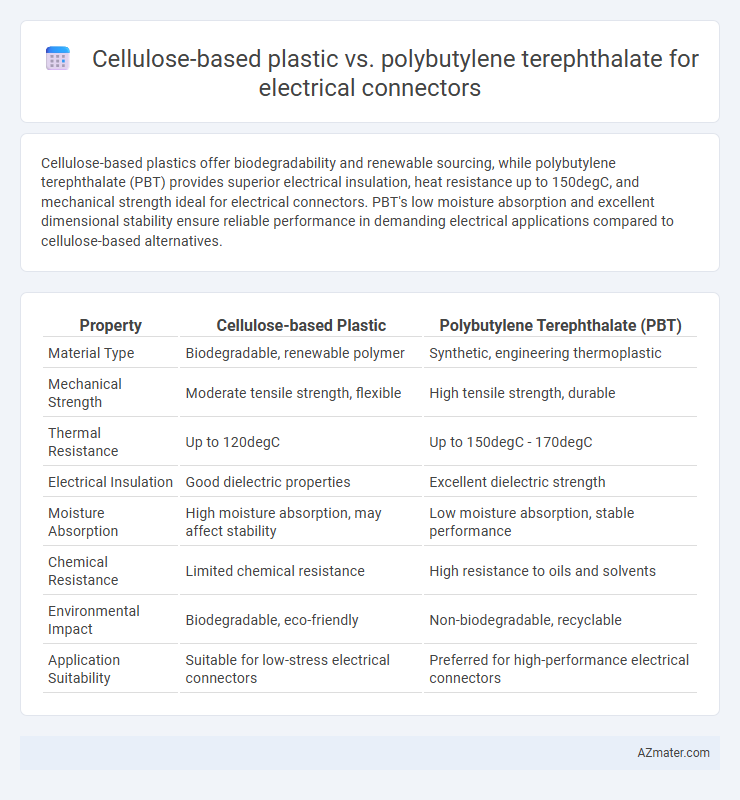Cellulose-based plastics offer biodegradability and renewable sourcing, while polybutylene terephthalate (PBT) provides superior electrical insulation, heat resistance up to 150degC, and mechanical strength ideal for electrical connectors. PBT's low moisture absorption and excellent dimensional stability ensure reliable performance in demanding electrical applications compared to cellulose-based alternatives.
Table of Comparison
| Property | Cellulose-based Plastic | Polybutylene Terephthalate (PBT) |
|---|---|---|
| Material Type | Biodegradable, renewable polymer | Synthetic, engineering thermoplastic |
| Mechanical Strength | Moderate tensile strength, flexible | High tensile strength, durable |
| Thermal Resistance | Up to 120degC | Up to 150degC - 170degC |
| Electrical Insulation | Good dielectric properties | Excellent dielectric strength |
| Moisture Absorption | High moisture absorption, may affect stability | Low moisture absorption, stable performance |
| Chemical Resistance | Limited chemical resistance | High resistance to oils and solvents |
| Environmental Impact | Biodegradable, eco-friendly | Non-biodegradable, recyclable |
| Application Suitability | Suitable for low-stress electrical connectors | Preferred for high-performance electrical connectors |
Overview of Cellulose-Based Plastics and Polybutylene Terephthalate
Cellulose-based plastics are derived from natural polymers found in plant cell walls, offering biodegradability and renewable sourcing for electrical connector applications. Polybutylene terephthalate (PBT) is a synthetic thermoplastic polyester known for its high mechanical strength, excellent electrical insulation properties, and resistance to heat and chemicals. Comparing these materials reveals cellulose-based plastics prioritize sustainability and environmental impact, whereas PBT excels in durability and performance under demanding electrical conditions.
Material Properties Comparison for Electrical Connectors
Cellulose-based plastics offer excellent biodegradability, high mechanical strength, and good electrical insulation properties, making them environmentally friendly alternatives for electrical connectors. Polybutylene terephthalate (PBT) boasts superior thermal stability, excellent chemical resistance, and high dimensional stability under electrical stress, which enhances connector durability in harsh environments. The choice depends on specific application requirements, balancing sustainability and performance in electrical insulation and mechanical robustness.
Mechanical Strength: Cellulose-Based Plastics vs PBT
Cellulose-based plastics exhibit high tensile strength and excellent biodegradability, making them suitable for sustainable electrical connectors, but they generally have lower impact resistance compared to polybutylene terephthalate (PBT). PBT offers superior mechanical strength, including enhanced impact resistance, dimensional stability, and resistance to thermal stress, which is critical for consistent performance in electrical connectors. The choice between cellulose-based plastics and PBT depends on the specific mechanical requirements and environmental considerations of the electrical connector application.
Thermal Stability and Heat Resistance
Cellulose-based plastics exhibit lower thermal stability with decomposition temperatures typically below 300degC, limiting their use in high-temperature electrical connectors. Polybutylene terephthalate (PBT) offers superior heat resistance with melting points around 220degC and excellent thermal stability, making it suitable for connectors exposed to continuous thermal stress. PBT also maintains electrical insulation properties and mechanical strength under elevated temperatures, outperforming cellulose-based plastics in demanding electrical applications.
Electrical Insulation Performance
Cellulose-based plastic offers excellent electrical insulation performance due to its natural dielectric properties and high resistance to electrical currents, making it suitable for low to moderate voltage electrical connectors. Polybutylene terephthalate (PBT) exhibits superior electrical insulation capabilities, characterized by high dielectric strength, low dielectric constant, and excellent thermal stability, which ensures reliable performance in high-voltage and harsh environment connectors. PBT's enhanced moisture resistance also maintains consistent electrical insulation properties over time, compared to cellulose-based plastics which may absorb moisture and degrade insulation effectiveness.
Environmental Impact and Sustainability
Cellulose-based plastic for electrical connectors offers significant environmental benefits due to its biodegradability and renewable origin, reducing reliance on fossil fuels and lowering carbon footprints compared to traditional polymers. Polybutylene terephthalate (PBT), while durable and resistant to heat and chemicals, is derived from petrochemical sources and poses challenges in biodegradability and recycling, leading to higher environmental impact. The sustainability profile of cellulose-based plastics aligns better with circular economy principles, supporting eco-friendly manufacturing and end-of-life disposal in electrical connector applications.
Cost Efficiency and Manufacturing Considerations
Cellulose-based plastics offer cost efficiency through renewable raw materials and lower energy consumption during production, making them attractive for sustainable electrical connectors. Polybutylene terephthalate (PBT) provides superior mechanical strength and thermal stability but involves higher material costs and more energy-intensive manufacturing processes. Manufacturing considerations favor cellulose-based plastics for eco-friendly markets, while PBT remains preferred for high-performance applications requiring durability and heat resistance.
Compatibility with Existing Connector Designs
Cellulose-based plastics offer excellent environmental sustainability but exhibit limited mechanical strength and thermal resistance compared to Polybutylene terephthalate (PBT), impacting their compatibility with high-performance electrical connector designs. PBT's superior dimensional stability and resistance to heat and chemicals ensure seamless integration with existing connector housings and contacts, maintaining consistent electrical performance. The inherent rigidity and processing versatility of PBT make it the preferred material for connectors requiring tight tolerances and long-term durability in demanding environments.
Lifespan and Long-Term Reliability
Cellulose-based plastics offer biodegradability but generally exhibit lower thermal stability and mechanical durability compared to Polybutylene terephthalate (PBT), impacting lifespan in high-stress electrical connector applications. PBT's superior resistance to heat, chemicals, and mechanical wear ensures extended long-term reliability and consistent electrical insulation performance. The longevity of electrical connectors in demanding environments is significantly enhanced by PBT's dimensional stability and resistance to degradation over time.
Future Trends in Electrical Connector Materials
Cellulose-based plastics offer renewable, biodegradable alternatives to traditional polymers, enhancing sustainability in electrical connector manufacturing. Polybutylene terephthalate (PBT) remains favored for its superior mechanical strength, thermal stability, and chemical resistance, critical for high-performance connectors in automotive and electronic applications. Future trends indicate a growing integration of bio-based composites and advanced PBT formulations to optimize durability, environmental impact, and electrical insulation properties.

Infographic: Cellulose-based plastic vs Polybutylene terephthalate for Electrical connector
 azmater.com
azmater.com